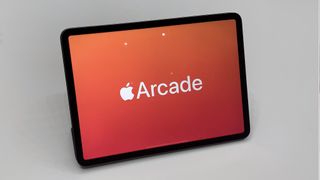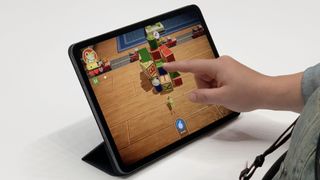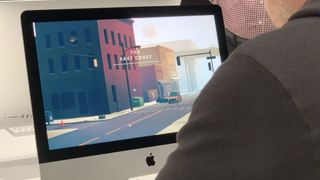Apple Arcade hands-on: Why people will pay to play in 2019

Last week, I got to go hands-on with a score of Apple Arcade launch titles and chat with almost a dozen developers about their collective goals, experiences, and dreams for Apple's new subscription gaming platform.
Load Screen
When I was a kid and I'd get a new Nintendo or Xbox or PlayStation game, I'd play the bits out of it. Because each cartridge or disk cost dozens and dozens of dollars — real money back then! — so I'd only ever have one, maybe two new games at a time, and I'd leave not a tile, not a sprite unexplored or unencountered.

Then the internet and mobile happened and suddenly supply dwarfed demand, scarcity evaporated, and we entered the age of abundance. Thousands, millions of games all available anywhere, anywhen, at the tap of an icon.
But that kinda also turned us all into jerks. Wait, just… let me explain.

At some point, collectively, we decided we wouldn't pay $50 for a game anymore. Not on mobile at least. Hell, we wouldn't pay $5. Fifty cents even. We wanted it all for free.
But, then, once we got it, we turned around and showed we would pay $5. $50. Hell, $500 or more just to have a better-looking farm than our friends or to get our car back out on the track faster and pimp-ed-er.
Ego and instant, game studios quickly learned, was the way to our gratification and our wallets.
Master your iPhone in minutes
iMore offers spot-on advice and guidance from our team of experts, with decades of Apple device experience to lean on. Learn more with iMore!
The age of free-to-play, micro-transactions, consumables, ads, and loot boxes was born.
And while we liked it, the way we like fast food, we never loved it, not like we ever loved the home cooking of those Mario and Halo and Grand Turismo games of old.
Updating...
Fixing that. Solving that. Balancing out that — so we can still have easy, ubiquitous access to games everywhere, everywhen, but ones that want to surprise and delight us, not frustrate and fleece us, that we can leave our kids alone with in the back seat and that we want to be left alone with on the couch. That's what Apple Arcade feels like it was designed to restore.

If you missed the original announcement back in March and the update at Apple's September iPhone event, here's the TL;DR:
Apple Arcade is a new, game subscription service from Apple. It launches on September 19, in over 150 countries, with over 100 new and exclusive titles that you can play across iPhone, iPad, Apple TV, and the Mac.
You'll be able to try it out for free for a month and, if you like it, keep it going for $4.99 a month for the whole family — which means anyone in your home set up on your Family Sharing account.

New games will be added continuously over time, you can download any and as many as you like, play online, if the game supports it, via Apple's Game Center, and otherwise keep enjoying them just like you would any game on iOS, tvOS, or macOS, for as long as you stay subscribed.
And all you ever pay is that one $4.99 subscription, for the family. No additional fees, in-app-purchases, in-game stores, levels to buy, or anything else. All games are fully complete and feature unlocked.
Now, I've known a lot of developers over the years, indie and studio, and getting one game ready for launch can be harrowing enough. Getting over 100 ready for the same launch? I can't even imagine. If Apple manages to pull off even a significant percentage of that, it'll be an amazing logistical and human engineering achievement.
But, while all the games are exclusive, and some are truly new as in we've never seen their like before, others are fresh takes or tweaks on familiar, even famous franchises.

Likewise the experience. Apple is adding a whole new tab to the App Store just for Arcade. That's the biggest, most valuable Real-estate in software today, and designing an experience that intrigues people tapping it for the first time to find out what it's like, and the 100th time to find something next to like, and the 1000th time when new and new-to-you content all has to get balanced and surfaced…
There's just so much I'm waiting to see and I think it's fair to say Apple is going to be spending most of the next few months figuring out.
Press Play to Begin
I got to try a wide variety of games across iPhone, iPad, Apple TV, and the Mac.

That was something that both challenged and delighted the developers I spoke with. Getting their games to not just look right but feel right on the small iPhone display and the bigger iPad display using touch for controls, on the Mac with mouse and trackpad, and on the Apple TV with game controllers. Which, could also work with the iPad. Nailing that, the experience specific to each platform but crafting an experience that persisted across platform, was everyone's goal.
And, to be honest, is probably something only Arcade could promote at scale. Given how much of a priority iOS gaming is and how it often feels Mac and even Apple TV just isn't. I mean, we'll get to it, maybe one day, if at all…

Being part of Arcade also means being able to take more risks. The goal is to make games that are the best, not games that can monetize the best, which is a very different thing.
If Arcade works like other subscription services, developers will get paid based on how much time you spend playing their games. That means they're still incentivized to get you playing and keep you playing, but the levers they can use to accomplish those aren't new-fangled loot boxes. They're old-school atmosphere, experience, and game-play.
And that was really on display in my hands-on. Some games were cute, others dark and moody. Some novel and others super nostalgic.

It feels like Apple spent a lot of time making sure there was a lot of diversity in the launch catalog. And developers have made sure it's not always in the way you'd expect.
Sure, there are stealth games, but maybe you're not a sniper… you're a Sasquatch.
There are puzzle games, but maybe not to climb a tower but to delve into your childhood memories.
There's Frogger and Chu Chu Rocket and Lego Brawls, but there's also Skate City, Projection: First Light, and Way of the Turtle.
One of the biggest, oldest knocks against Apple has been that they don't get gaming.
It's usually made by studios and players who want a hardcore, PC-like, even console-like experience on the Mac or iOS.
The truth is, there are a lot of hardcore gamers at the highest levels of Apple. They just recognized with the advent of the iPhone that casual gaming was a far, far better market for them.
Still, when you see things like the Siri Remote and ODR being forced on developers for the launch of the Apple TV, just killing any hopes for the platform to succeed in gaming before it even began, and, yeah, sure they were reversed later but, turns out, way too late, it's a totally fair knock to make and question to ask.
Can Apple Arcade succeed and what even does success mean?
Next Level
For me, I think, the answer is simple: It can and will succeed for as long as Apple stays behind it. And success, for me, will be that it launches and sticks around.

And not just because I don't want to have to worry about free-to-play games. Because developers won't have to worry about making free-to-play games.
And I won't have to worry about leaving my god kids with those games.
Beyond that, personally, surprise surprise, I'm pretty much the target audience for this. I don't have a lot of time to play, so the idea of a curated collection of totally unlocked twists on classics and modern curios is immensely appealing.
But it's not all, even at all, about me, and to really succeed, Apple's going to have to appeal to a wide swathe of casual gamers of all tastes and temperaments.
Beyond even that, Apple may well see financial opportunity in Arcade, and if it makes a ton of money for everyone, that'll be fanatic for them. But I think Apple also sees responsibility, and if they can help developers make the kind of games that I so many of us used to play the bits out of as kids — that we want so much for our kids.
Well, then, that'll be fantastic for all of us.

Rene Ritchie is one of the most respected Apple analysts in the business, reaching a combined audience of over 40 million readers a month. His YouTube channel, Vector, has over 90 thousand subscribers and 14 million views and his podcasts, including Debug, have been downloaded over 20 million times. He also regularly co-hosts MacBreak Weekly for the TWiT network and co-hosted CES Live! and Talk Mobile. Based in Montreal, Rene is a former director of product marketing, web developer, and graphic designer. He's authored several books and appeared on numerous television and radio segments to discuss Apple and the technology industry. When not working, he likes to cook, grapple, and spend time with his friends and family.
Most Popular





